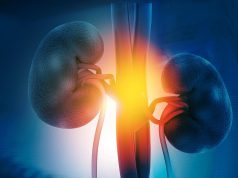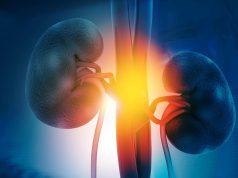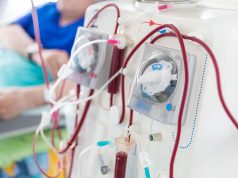Participants with eGFR <45 mL/min/1.73 m2 had greater net benefits than those with eGFR ≥45 mL/min/1.73 m2
By Elana Gotkine HealthDay Reporter
WEDNESDAY, Nov. 12, 2025 (HealthDay News) — Nearly all adults with chronic kidney disease (CKD) would benefit from a systolic blood pressure (BP) target <120 versus <140 mm Hg, according to a study presented at Kidney Week, the annual meeting of the American Society of Nephrology, held from Nov. 5 to 9 in Houston.
Alan R. Vera, from the University of California Davis in Sacramento, and colleagues estimated the individualized net benefit of intensive BP lowering among persons with CKD in the Systolic Blood Pressure Intervention Trial (SPRINT). The difference in risk between treating to a systolic BP target of <120 versus <140 mm Hg for all-cause death, cardiovascular outcomes, cognitive outcomes, and BP treatment-related harms was examined among 2,012 participants with CKD at baseline (estimated glomerular filtration rate [eGFR] <60 mL/min/1.73 m2).
The researchers found that the median net benefit was 6.4 percent, and 100 percent had a net benefit favoring intensive BP lowering when simulating preferences for participants who viewed the benefits of intensive BP lowering as more important than treatment-related harms. The median net benefit was 2.2 percent, and 90 percent had a positive net benefit in a sensitivity analysis when simulating benefits and harms to have similar importance. In both preference scenarios, participants with eGFR <45 mL/min/1.73 m2 had greater net benefits than those with eGFR ≥45 mL/min/1.73 m2.
“Evidence about blood pressure targets from SPRINT can be personalized to adults with hypertension and CKD by using each individual’s estimated risks and preferences for multiple outcomes related to blood pressure lowering, which could help facilitate shared decision-making conversations,” Vera said in a statement.
Copyright © 2025 HealthDay. All rights reserved.








